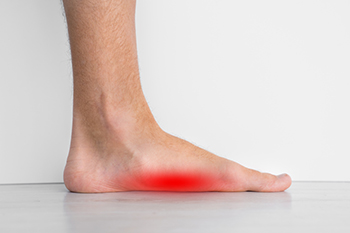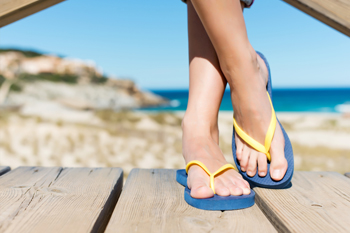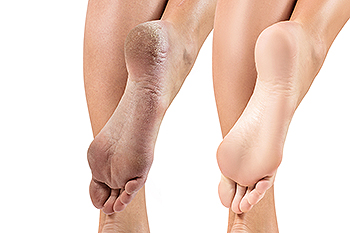Connect With Us
Blog
Items filtered by date: October 2021
Do Your Child's Feet Hurt?
The Two Types of Flat Feet
Flat feet, or pes planus, is a condition where there is no visible arch in the foot. There are two types of flat feet: flexible and rigid. Flexible flat feet will have a visible arch when the foot is elevated, however that will disappear when weight is applied to the foot. Typically, flexible flat foot is asymptomatic, and it is believed to be a genetic condition. In rigid flat foot, the arch is never present—even when the foot is elevated. Rigid flat foot can be due to joint or bone disorders, which may be genetic. This type of flat foot can be problematic and cause gait disorders as well as pain in the arch, ankle, heel, and outside of the foot. If you have any discomfort in your feet due to flat feet, make an appointment with a podiatrist who can examine your feet and go over treatment options specific to your condition.
Flatfoot is a condition many people suffer from. If you have flat feet, contact David A. Edmonds, DPM from Advanced Podiatry Associates. Our doctor will treat your foot and ankle needs.
What Are Flat Feet?
Flatfoot is a condition in which the arch of the foot is depressed and the sole of the foot is almost completely in contact with the ground. About 20-30% of the population generally has flat feet because their arches never formed during growth.
Conditions & Problems:
Having flat feet makes it difficult to run or walk because of the stress placed on the ankles.
Alignment – The general alignment of your legs can be disrupted, because the ankles move inward which can cause major discomfort.
Knees – If you have complications with your knees, flat feet can be a contributor to arthritis in that area.
Symptoms
- Pain around the heel or arch area
- Trouble standing on the tip toe
- Swelling around the inside of the ankle
- Flat look to one or both feet
- Having your shoes feel uneven when worn
Treatment
If you are experiencing pain and stress on the foot you may weaken the posterior tibial tendon, which runs around the inside of the ankle.
If you have any questions please feel free to contact our offices located in Northampton and Allentown, PA . We offer the newest diagnostic and treatment technologies for all your foot and ankle needs.
The Importance of Foot Care For Diabetics
 Neuropathy, a form of nerve damage, is known for causing a loss of feeling in the feet, and roughly half of all diabetic patients have some type of neuropathy. Because of this lack of feeling, many small problems with the feet may not be noticed and thus lead to the development of serious issues. To help avoid missing the small issues that can occur with the feet, there are some daily things that diabetic patients can do. Daily checks for cuts and wounds, regularly washing the feet, wearing shoes that fit right, and avoiding going barefoot are a few of the things that can be done to help care for the feet once they have lost some feeling. Along with regular checkups, diabetic patients should consult with a podiatrist if they notice a loss of sensation in the feet, a change in shape or color to the feet, or loss of hair on the feet.
Neuropathy, a form of nerve damage, is known for causing a loss of feeling in the feet, and roughly half of all diabetic patients have some type of neuropathy. Because of this lack of feeling, many small problems with the feet may not be noticed and thus lead to the development of serious issues. To help avoid missing the small issues that can occur with the feet, there are some daily things that diabetic patients can do. Daily checks for cuts and wounds, regularly washing the feet, wearing shoes that fit right, and avoiding going barefoot are a few of the things that can be done to help care for the feet once they have lost some feeling. Along with regular checkups, diabetic patients should consult with a podiatrist if they notice a loss of sensation in the feet, a change in shape or color to the feet, or loss of hair on the feet.
Diabetic foot care is important in preventing foot ailments such as ulcers. If you are suffering from diabetes or have any other concerns about your feet, contact David A. Edmonds, DPM from Advanced Podiatry Associates. Our doctor can provide the care you need to keep you pain-free and on your feet.
Diabetic Foot Care
Diabetes affects millions of people every year. The condition can damage blood vessels in many parts of the body, especially the feet. Because of this, taking care of your feet is essential if you have diabetes, and having a podiatrist help monitor your foot health is highly recommended.
The Importance of Caring for Your Feet
- Routinely inspect your feet for bruises or sores.
- Wear socks that fit your feet comfortably.
- Wear comfortable shoes that provide adequate support.
Patients with diabetes should have their doctor monitor their blood levels, as blood sugar levels play such a huge role in diabetic care. Monitoring these levels on a regular basis is highly advised.
It is always best to inform your healthcare professional of any concerns you may have regarding your feet, especially for diabetic patients. Early treatment and routine foot examinations are keys to maintaining proper health, especially because severe complications can arise if proper treatment is not applied.
If you have any questions please feel free to contact our offices located in Northampton and Allentown, PA . We offer the newest diagnostic and treatment technologies for all your foot and ankle needs.
Flip-Flops Can Be Bad for Kids’ Feet
Many children wear flip-flops, especially during the warm summer months. However, those flip-flops can impact their feet long after the end of summer vacation. Heel and arch pain are common complaints among children who wear flip-flops. The heel bone continues to grow even into the midteen years and requires adequate cushioning and support. Flip-flops provide no support to the heel, causing the growth plates in the heel bones to become inflamed, tender, and painful. Frequent flip-flop wearing also makes various foot and ankle problems, such as Achilles tendonitis, ankle sprains, broken toes, plantar warts, and athlete’s foot more likely. If your child complains of foot pain, it is suggested that you schedule them an appointment with a podiatrist.
Flip-flops are not always the best choice of footwear. If you have any concerns about your feet or ankles, contact David A. Edmonds, DPM from Advanced Podiatry Associates. Our doctor will assist you with all of your foot and ankle needs.
Flip-Flops and Feet
When the weather starts warming up, people enjoy wearing flip-flops. Flip-flops are comfortable, stylish, and easy to slip on and off; they're perfect for any summer beach goer. However, these shoes can cause harm to the feet.
How Can Flip-Flops Affect Me Long-Term?
- Ankle problems
- Hip problems
- Lower back problems
- Pain in the balls of the feet
- Problems with foot arches
- Changes in the way you walk
Are There Injuries Associated with Flip-Flops?
Yes. Since flip-flops are relatively weak and do not provide the same amount of support as sneakers, people who wear flip-flops regularly are more susceptible to injuries. On top of that, the open nature of the shoe makes your feet more prone to other problems, such as cuts and even infections. Common injuries and ailments include:
- Sprained ankles
- Blisters
- Infections
- Cuts and Scrapes
I like Wearing Flip-Flops. Are There Safe Alternatives?
When buying flip-flops, try to find ones that have sturdy soles and that are made of high-quality materials that will support for your feet. These flip-flops will cost more but will also last longer as a result.
If you have any questions please feel free to contact our offices located in Northampton and Allentown, PA . We offer the newest diagnostic and treatment technologies for all your foot and ankle needs.
What Causes Heel Fissures?
Heel fissures are cracks in the dry skin on a person’s heels. While they are often a cosmetic concern, they can also be painful. In severe cases, heel fissures can turn into deep cracks and even bleed, making it difficult to walk and raising the risk of infection. Cracked heels are also a serious concern for anyone with diabetes or a compromised immune system. Heel fissures have a variety of potential causes. These include wearing shoes with open backs, being overweight, living in a dry climate, or having other skin conditions like eczema and psoriasis. For more information about heel fissures and what can be done to prevent and treat them, please consult with a podiatrist.
If the skin on your feet starts to crack, you may want to see a podiatrist to find treatment. If you have any concerns, contact David A. Edmonds, DPM from Advanced Podiatry Associates. Our doctor can provide the care you need to keep you pain-free and on your feet.
Cracked Heels
It is important to moisturize your cracked heels in order to prevent pain, bleeding, and infection. The reason cracked heels form is because the skin on the foot is too dry to support the immense pressure placed on them. When the foot expands, the dry skin on the foot begins to split.
Ways to Help Heal Them
- Invest in a good foot cream
- Try Using Petroleum Jelly
- Ease up on Soaps
- Drink Plenty of Water
Ways to Prevent Cracked Heels
- Moisturize After Showering
- Skip a Shower
- Keep Shower Water Lukewarm
- Don’t Scrub Your Feet
If you are unsure how to proceed in treating cracked heels, seek guidance from a podiatrist. Your doctor will help you with any questions or information you may need.
If you have any questions, please feel free to contact our offices located in Northampton and Allentown, PA . We offer the newest diagnostic and treatment technologies for all your foot care needs.




